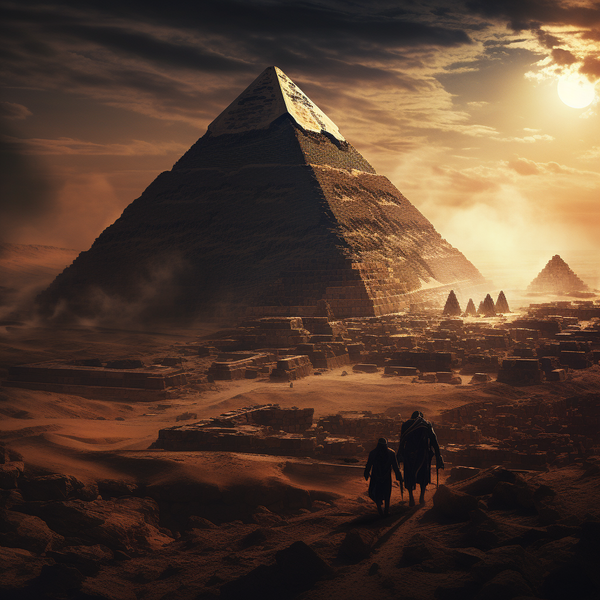The Myth of Atlantis
The myth of Atlantis is an ancient story told by Plato and one of the most popular myths in history. So let's look at the probability of this being real.

This original article was published in early 2022. It's just a fun thought experiment, it's probably not accurate or real, but it's a fun exploration.
Update in 2023: The Richart Structure
The most convincing argument for a potential Atlantis is that of the Richat Structure...
Could the Eye of the Sahara Hold the Key?
The legendary lost city of Atlantis has fascinated humankind for over two thousand years. Ever since the Greek philosopher Plato first described the mythical island civilization in his writings, theories and speculation about Atlantis have abounded. Its true location and fate remain shrouded in mystery. But recently, a unique geologic formation deep in the Sahara desert has emerged as a candidate for the site of the long lost city - the Eye of the Sahara.

Known also as the Richat Structure, the Eye is an immense circular formation visible from space. Measuring roughly 25 miles across, it stands out starkly in the arid landscape of Mauritania near the Atlantic coast of Africa. The Richat Structure is marked by dramatic concentric rings of exposed sedimentary rock, almost resembling a bull's-eye target. The entire dome-like structure rises over 1600 feet from the center point. From above, it is easy to see why it is called the Eye.
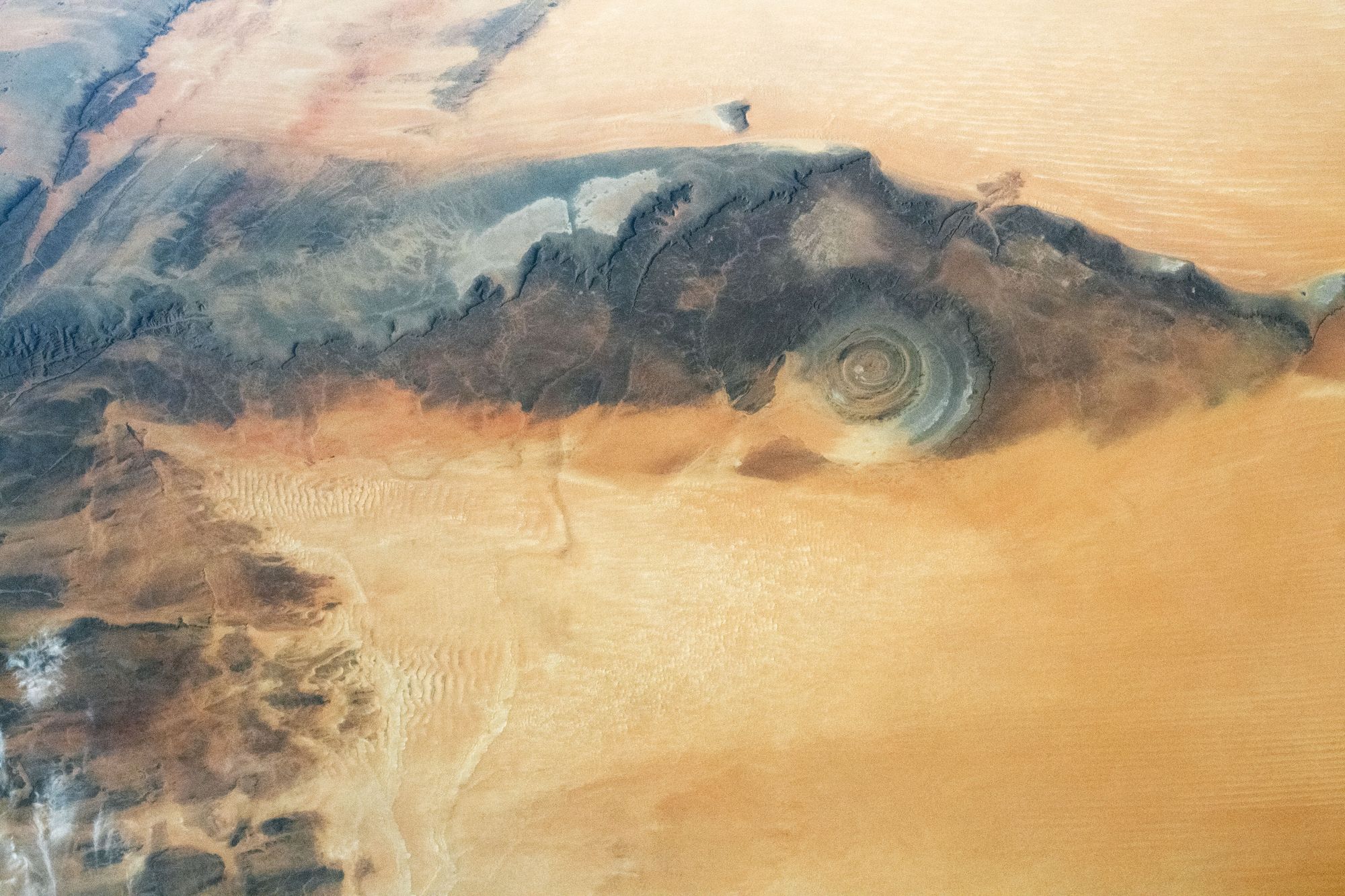
The breathtaking scale and unusual configuration of the Eye of the Sahara have fueled speculation that this could be the location of Atlantis. Plato described the mythical city as having a circular plan of alternating rings of land and water. The Eye's concentric rings of bare rock bear an eerie resemblance to this description. Though now deep in the desert, some evidence suggests the Richat Structure was once surrounded by water, forming an island oasis.

Local legends from the region tell tales of an ancient city submerged beneath the sands. Could this folklore represent a cultural memory of Atlantis passed down through the centuries? Some researchers think so, and suggest sites near the Eye hold remnants of this once great civilization. Suspicious rock formations resembling ruins, channels that may have been ancient waterways, and odd geography indicating previous coastlines all provide tantalizing clues.
Mainstream geologists attribute the Eye of the Sahara to natural processes shaped over eons. However, its placement conforms intriguingly with Plato's account of Atlantis lying beyond the Pillars of Hercules at the mouth of the Mediterranean. While not exactly there today, plate tectonics and changing sea levels since Atlantean times could have drastically remade the landscape.
If the Eye of the Sahara was indeed the site of Atlantis, it would have profound implications for life in Northern Africa at the time the city existed. Based on Plato's account, Atlantis flourished around 9,600 BC during the end of the last Ice Age. Here are some thoughts on how life may have looked:
- Climate - The Sahara region was more temperate than today, with a wetter climate supporting grasslands and lakes. This allowed settlement and agriculture to develop at the Eye of the Sahara, which would have been a fertile oasis.
- Society - Atlantis was described as an advanced civilization with sophisticated engineering, architecture and agriculture. If true, it means an advanced indigenous African society arose in the area independently.
- Trade - With a milder climate, travel and trade within Africa was easier. The Atlantians likely traveled north along the Nile valley to trade artifacts, crops, metals, and livestock.
- Sea Trade - Evidence suggests extensive trade existed between Ancient Egypt, Crete, and the Near East. The Atlantians may have used large sailing vessels to conduct robust sea trade networks across the Mediterranean.
- Culture - As a hub of civilization, the Eye of the Sahara would have been a melting pot of cultural influences from across Africa, Europe and the Middle East. A rich local culture likely existed.
- Agriculture - The wet climate, rivers and lakes allowed large-scale agriculture to feed the city. They perhaps farmed crops like emmer wheat, barley, chickpeas, lentils and flax.
- Decline - Atlantis was said to be destroyed by natural disasters and flooding. This could coincide with rising sea levels and climate change at the end of the Ice Age around 9,600 BC.
Newly Declassified CIA Documents
Newly declassified CIA documents reveal a fascinating hidden slice of Cold War history linking the US government to the age-old mystery of Atlantis.
U-2 photography taken on 22 May 1967 overflew the Richat Structure in Mauritania, but no new evidence concerning this possible meteorite impact structure was observed. – Declassified Report

In 1967, at the height of spycraft between the US and USSR, the CIA dispatched a U-2 spy plane to photograph and surveil the eye-catching circular Richat Structure geological formation in the Sahara Desert of Mauritania. This "Eye of the Sahara" has been rumored in recent decades to be the site of the mythical lost city of Atlantis.
But the CIA wasn't looking for sunken cities - it was identifying potential Soviet missile launch sites and military infrastructure across Africa. In the 1960s space race, no unusual land feature went unchecked.
Though the CIA found no signs of Atlantis, missile silos or Soviets in the strange Saharan eye, the mission offers a telling example of just how far each side was willing to go to gain intelligence on the other. Even putative lost continents and craters didn't escape scrutiny as possible covers for clandestine activities.
What other fascinating moments of intrigue between past superpowers remain obscured in old CIA filing cabinets? The glimpse into this cat and mouse game in the desert sands makes you wonder what else we might learn someday. For now, the Eye of the Sahara keeps its full secrets, whether mythical or merely geological, hidden beneath the hazy Saharan sky.
Still an Enigma
The Richat Structure's origins remain enigmatic. Much more research would be needed to substantiate any direct link with Atlantis. But the coincidences are compelling, keeping alive hope that archaeology may one day uncover evidence of the fabled city in the sands of Mauritania. For now, the Eye of the Sahara stands as a monument to the enduring mystique of Atlantis and the secrets still hidden beneath the desert.
Here is Jimmy Corsetti presenting his theory:
And his conversation with Joe about it on the JRE:
Now, back to the original post...
What is Atlantis?

Atlantis is a mythical island, often placed in the Atlantic Ocean. It was first mentioned by the Greek philosopher Plato, who spoke of Atlantis in "Timaeus" and "Critias," two of his dialogues, around 360 BCE.
According to the myth, Atlantis was inhabited by half-god and -human people. They were very prosperous and powerful, ruling the land with wisdom and fairness. These people dominated all others until their hubris angered the gods. The gods decided that the people of Atlantis needed to be punished. Atlantis was destroyed in a terrible cataclysm, complete with earthquakes and floods. The island plunged into the ocean, and the civilization was lost forever.
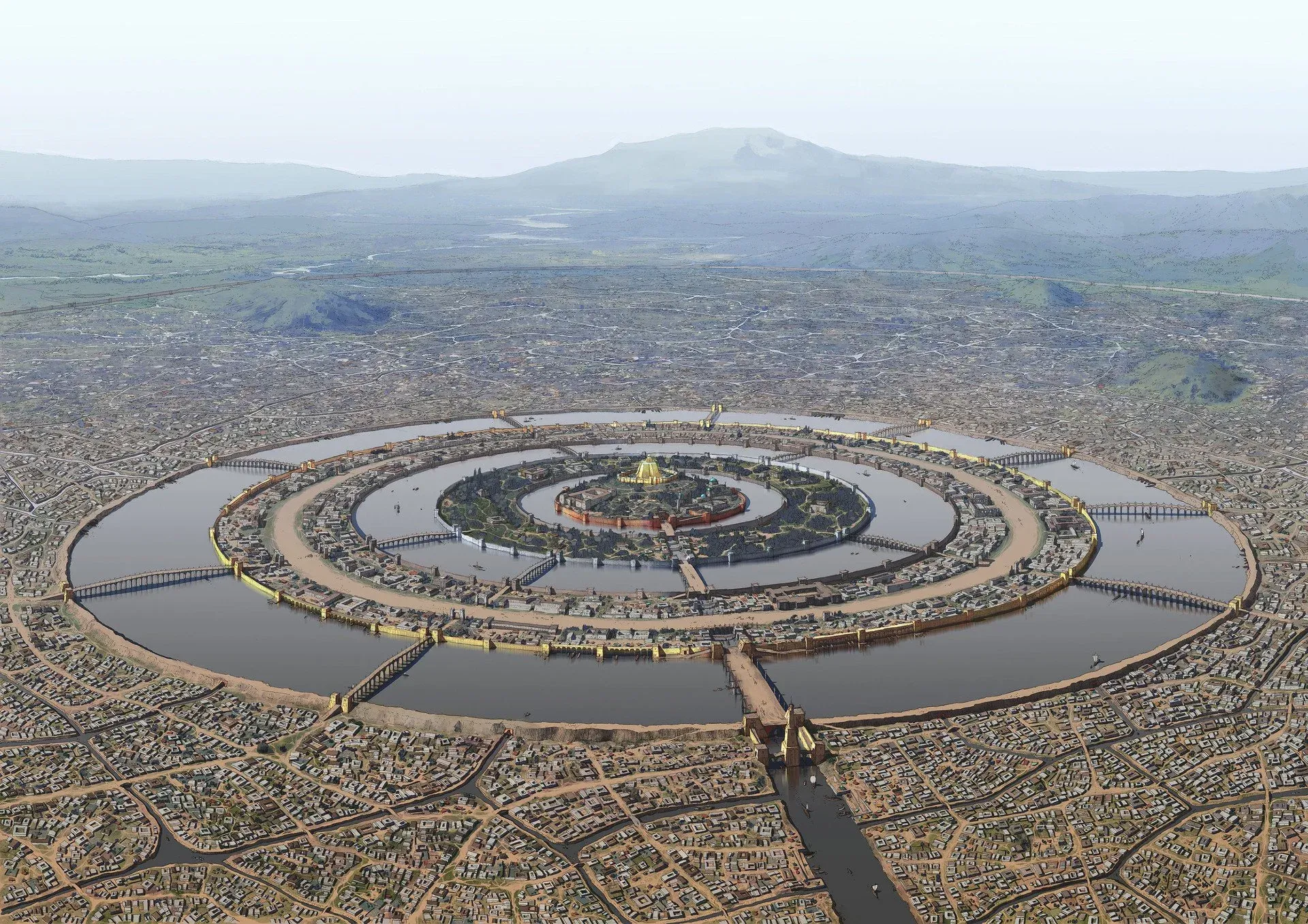
Plato encouraged his students to question myth and ancient history – the myth of Atlantis helped Plato do this because it questioned in a very public way the Great Deluge myth that had been around in texts in the Ionic region since the early Mycenaean period.
Plato attributed his knowledge of the myth to a document his grandfather preserved from Solon, an ancient Athenian who visited Egypt in the 6th century BCE.
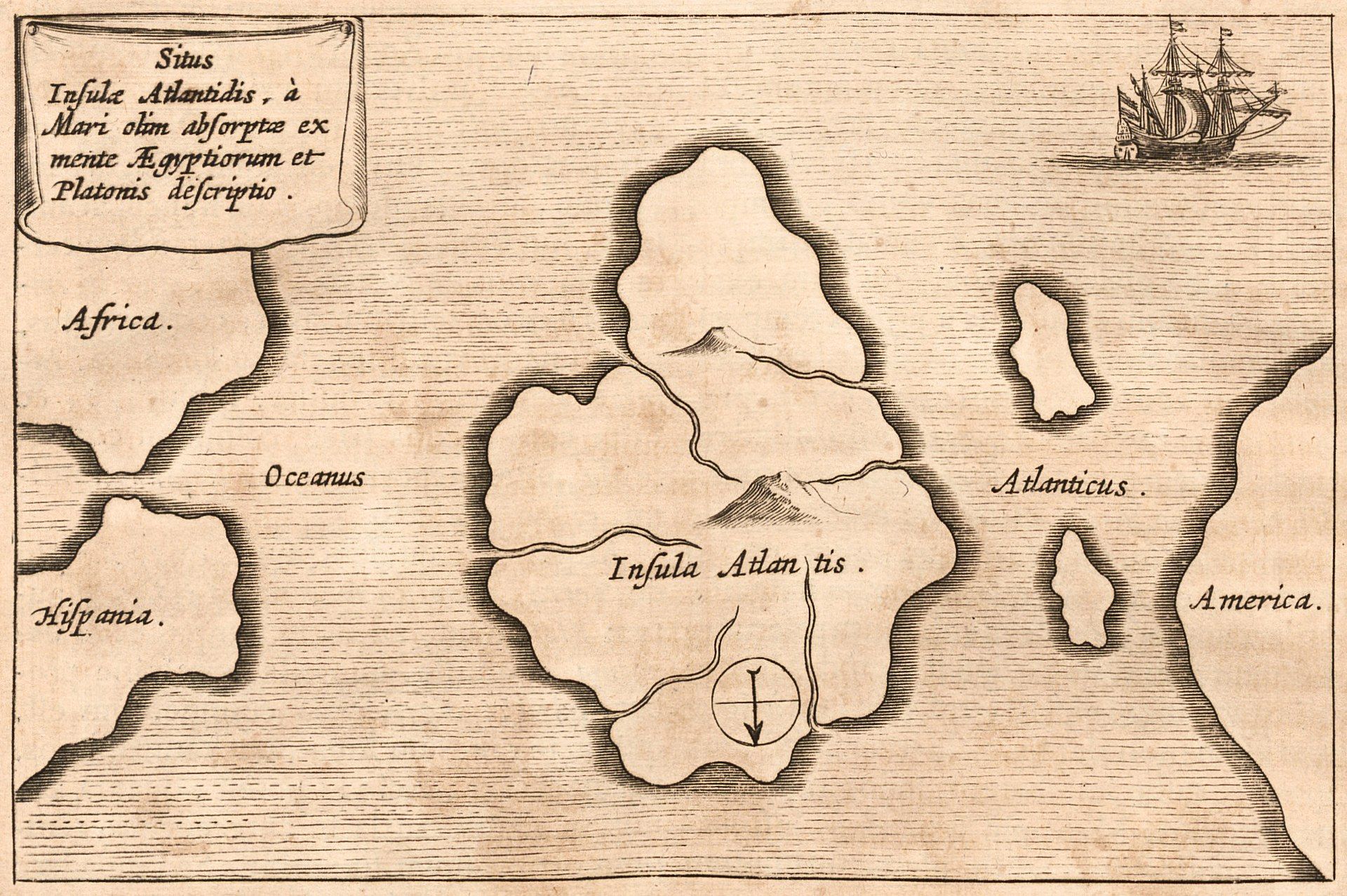
Solon of Egypt was an Athenian legislator and poet who visited the city of Sais in Egypt. He learned about the myth of Atlantis from the priests there and brought it back to Greece.
Oh – also – Atlantis was ruled by Atlas, the son of Poseidon, and had 10 sub-kingdoms ruled by Atlas' children. At least according to Plato's myth.
The Lost Utopia of Atlantis
But is Atlantis merely fictional legend or could it be based on some kernel of truth lost to history?
With this legendary origin in mind, the lost utopia of Atlantis has fascinated humanity for over two thousand years, ever since the Greek philosopher Plato first introduced it in his famous writings around 360 B.C.
Plato wrote that Atlantis was an island empire ruled by the sea god Poseidon located beyond the Pillars of Hercules, often associated with the Strait of Gibraltar. It was an idyllic maritime hub of culture and technology more advanced than any known ancient civilization.
Atlantis was described as having an enormous capital city decorated lavishly in gold, silver, and exotic building materials. Fed by an intricate system of canals, bridges, and harbors, Atlantis supposedly had full access to the surrounding ocean and fertile plains.
The city was centered around a great palace and holy temple situated atop a small mountain peak, dedicated to the revered deities Poseidon and Cleito. Surrounding this ceremonial epicenter stretched enormous circular trenches filled with water from the sea, connected by wide bridges broad enough for ships to pass through. Radiating outwards, a series of similar concentric moats and causeways divided the city into rings.
The opulence of the inner temple reflected the wealth of Atlantis, with statues fashioned from the finest gold depicting the noble ten kings who founded the city, along with their wives. Precious metals and exotic building materials brought in by an extensive trade network adorned the soaring spires of the palace and cult buildings.
Now in this island of Atlantis there existed a confederation of kings, of great and marvellous power, which held sway over all the island, and over many other islands also and parts of the continent; and, moreover, of the lands here within the Straits they ruled over Libya as far as Egypt, and over Europe as far as Tuscany.
But the Atlantians grew greedy and corrupt, warring with Athens in a bid for global domination. The gods took notice, and violently sank Atlantis beneath the waves in a single day and night of fire, earthquakes and floods. Atlantis was swallowed forever, leaving only tantalizing clues to its existence.
Tales of sunken continents have permeated folklore and literature since Plato introduced Atlantis. Whether allegory or distorted fact, the story resonates. In the years that followed the dialogue, many ancient writers such as Xenocrates viewed the story of Atlantis to be historical fact, but some saw Plato's work as fictional or metaphorical myth. Atlantis represents the universal desire for knowledge of human origins and our yearning for wisdom from past civilizations greater than our own.
Modern researchers continue the quest to pinpoint Atlantis, hoping that beneath the waves, ruins or relics yet remain. While elusive, the promise of unlocking the secrets of this utopian yet doomed island society compels us to keep searching. Atlantis exemplifies the human drive to explore, understand our history, and feed our imagination.
Atlantis in the Renaissance: The Legendary City in Bacon and More
The story of the mythical lost city of Atlantis has resonated through the centuries since Plato first described it in his ancient dialogues. In the 16th and 17th centuries, Renaissance writers revitalized the Atlantis myth, using the iconic ancient civilization as inspiration for their own utopian works.
One of the most prominent examples is the 1626 novel, Francis Bacon's New Atlantis, which portrayed a fictional island called Bensalem inhabited by a people with a high level of technology and devotion to Christian virtue and chastity. Bacon used the Atlantis myth not just to imagine a perfect society, but to promote the growth of science and discovery. His novel depicted some forward-thinking innovations like refrigeration, submarines, and telescopes.
Thomas More's famous 1516 book Utopia also drew inspiration from the legend of Atlantis. More's fictional island of Utopia represented his vision of an ideal communist society where private property did not exist. The citizens lived in harmony, with ample leisure time devoted to learning and creativity rather than material gain. More used the Atlantis myth to reflect on the flaws of European society at the time.
Bacon and More essentially reimagined Atlantis not as a sunken ancient civilization, but as an exemplar for a more perfect future society. The Atlantis legend clearly stirred utopian visions about the potential of human communities. While the true location and nature of Atlantis remain a mystery, the Renaissance reinvented it as a powerful thought experiment about ideal civilization. Its legacy continues to propagate today.
Ignatius Donnelly Revives Atlantis as Source of Ancient Wisdom
In 1882, U.S. Congressman Ignatius Donnelly published Atlantis: The Antediluvian World, a book that sparked renewed interest in Atlantis and advanced pseudo-archaeological theories connecting Atlantis to ancient civilizations worldwide.
Donnelly's book argued Atlantis was a real place, home to an incredibly advanced civilization possessing technologies and wisdom far beyond any known ancient culture. When Atlantis sank, its refugees brought their knowledge to other parts of the world. According to Donnelly, similarities between ancient legends, myths, religions, artifacts, and archaeological sites across diverse cultures provided evidence of Atlantis' global reach.
Expanding on fragments from Plato's dialogues, Donnelly vividly depicted Atlantis as an idyllic empire of prosperous kingdoms dotted with opulent temples and palaces, glorious harbors crowded with ships, and an impressive capital city built around a golden temple to Poseidon. The Atlanteans had mastered metallurgy, agriculture, architecture, engineering, and more. Their wise priests studied astronomy, mathematics, medicine, and geology.
But greed and apathy corrupted Atlantis, and the gods unleashed violent earthquakes and floods in punishment. As Atlantis submerged, survivors escaped in ships to pass on their knowledge. Donnelly claimed crucial concepts like religion, agriculture, and language had roots in ancient Atlantis. Similarities between cultures, like the pyramids of Egypt and Mexico, provided evidence of Atlantis' global significance.
While modern archaeologists and historians dismiss Donnelly's fantastical claims about Atlantis, his book catalyzed a flood of theories connecting disparate ancient cultures. More than a century after its publication, Donnelly's vision of Atlantis as the genesis of human civilization continues to inspire new speculation. The allure of a long-lost advanced society remains irresistible.
What are the conditions for Atlantis in the Atlantic?
Usually, I subscribe to the idea that Atlantis is a myth told for entertainment, much like the Greek gods. But let's look at what we know today...
The Azores are 1,400km from Lisbon and 1,900km from Canada and sit above a submerged plateau – a perfect location matching the myth and geographical requirements for a lost empire.
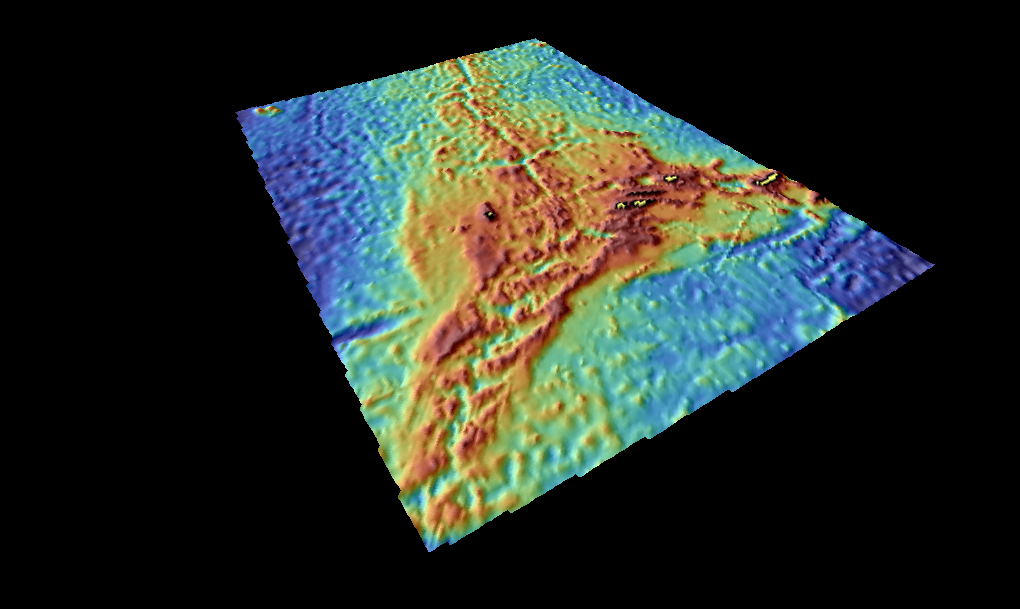
Generally accepted human history places sapiens running around for 300k years, but mostly doing boring cave-related things until 13k years ago. The last glacial period ran wild from 100k to 12k years ago, and the peak of glacial sheets covering Earth spanned approximately 30k to 10k years ago.

All the while, humans made small boats – mostly canoe-like rafts – for at least the last 40k years. The real question is: how many attempts would it take to successfully traverse the Atlantic ocean from Lisbon to the Azores? You probably only need one if you're half god, but more than a few if you're only human.
How likely was Atlantis?
I'll use IPCC words of estimation to break down the elements here...
Is it possible that 20k years ago...
- the Azores plateau was above current sea levels? Likely.
- someone created a boat to take humans from Africa/Europe to Azores? Even chance.
- the massive ice melting would alter sea levels and redraw coastlines/islands? Very likely.
These variables have some prior evidence to point towards; however, let's look at elements of the myth (some original, some added later).
Possible that the people on Azores...
- flourished 1-10k years before Plato? Even chance.
- had a metal like gold or copper? Even chance.
- had a strong military? Even chance.
- made statues with copper, gold, and silver? Even chance.
- made separate baths for royalty, and men and women? Even chance.
- had a beautiful land with mountains, rivers, lakes, and valleys? Very likely.
- formed a federation on their islands? Likely.
- had great lumber reserves? Likely.
- cultivated diverse plant life? Likely.
- enslaved people? Likely.
- built bridges? Unlikely.
- had elephants? Unlikely.
- made separate baths for animals? Unlikely.
- had a great navy? Unlikely.
- built stadium-sized temples? Unlikely.
- cut rings in the land to form islands? Unlikely.
- had densely populated cities? Very unlikely.
- built temples to Greek gods? Very unlikely.
- had electricity or other futuristic technology? Very unlikely.
- formed a global federation, ruling Libya, Europe, and Egypt? Very unlikely.
- had a massive army of 60k men, 10k chariots, and 1.2k ships? Very unlikely.
- were ruled by half-god kings? Exceptionally unlikely.
Why are many unlikely to exceptionally unlikely? There are little to no past priors of other civilizations harnessing future technology, creating great structures outside of Egypt, praising future civilizations' gods, or ever being even quarter-part gods (not even the pharaohs) at this period of history.
Why is it very unlikely Atlantis organized Earth's kingdoms and traded globally? There are no recorded stories or documents of Atlantis, and all details originate at one place: Plato (via his grandfather via Solon). Plato spoke of kingdoms known to the Greek's but left out the Americas and Asia. Stories passed as history, but originating from a single source tend to be a myth.
What if Atlantis wasn't in the Atlantic?
Let's review the possibility that a lost civilization was located...
- in the Mediterranean? Likely.
- in the Atlantic at the Azores? Even chance.
- elsewhere in the Atlantic? Even chance.
- on the island known as Ireland? Very unlikely.
- in the North Sea? Unlikely.
- in the Caribbean? Even chance.
There is strong evidence of lost civilizations in the Aegean sea, but there is declining evidence elsewhere. Plato speaks of Atlantis being in the Atlantic ocean, and there is little evidence of ancient Egypt interacting with people from the Caribbean or Nordic lands. Evidence of past, basic civilization was found offshore in the North Sea. And to date, there's no evidence of ancient, lost civilizations on the island of Ireland.
What's the probability of Atlantis?
If all elements above are equal, with equal evidence of past priors, and we ignore things like the prior evidence of myths being fiction, or ever discovering one lost ancient civilization of any technological advancement... there's less than a 40% probability of a lost Atlantic civilization existing, and it's far from matching the details in the Atlantis myth.
It's more probable – like most "history" told from this period – that the myth of Atlantis was used for entertainment and education (through parables).
Is it fun to believe in lost advanced civilizations?
Yes.
Also available as a Twitter thread...
Usually I subscribe to the idea that Atlantis is a myth told for entertainment, much like the Greek gods.
— Stephen M. Walker II (@smwii_) February 6, 2022
But if I were to think it was real...
The origin of the post you are reading now...


